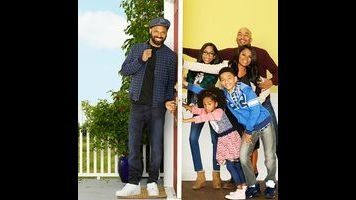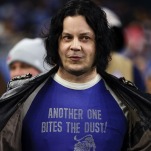As ABC’s slate of family comedies has gotten more consistent, they have also become more homogeneous. There’s now a rigid house style for ABC’s domestic sitcoms: single-camera, stylized, heavy on music and voice-over, and prone to flashbacks and cutaway gags. ABC’s sitcoms also come with a perspective, a culturally or temporally specific viewpoint that brings freshness to otherwise stale sitcom setups. The formula has worked well, and among Fresh Off The Boat, Black-ish, The Real O’Neals, The Middle, and The Goldbergs, there’s not a dud in the bunch. (Even Modern Family, the forebear of the ABC style, is still solid on occasion.) So if there’s a silver lining around the visible fart that is Uncle Buck, ABC’s latest single-cam outing, it’s that the show is different from its network peers. The difference is that it sucks.
Uncle Buck, which borrows its sitcom-friendly premise from the John Hughes movie of the same name, looks as handsome as any of ABC’s other shows. But it has neither a unique style nor an interesting perspective. Its sense of humor is more on par with ABC’s multicamera comedies like Dr. Ken and Last Man Standing, but even those shows have a clearer point of view than Buck, which goes out of its way to be as down-the-middle as possible. The twist, if it can be called that, is that this Uncle Buck is about a black family, which is only significant in as much as the title becomes a bit questionable within that context. The title is especially questionable since none of the movie’s charm made it to the series.
The setup is, at least, what the title promises: A harried husband and wife draft his ne’er-do-well brother to help take care of the children. He’s unconventional, but he’s effective, and just maybe he’s exactly what this family needs. In this version, the family consists of Will and Alexis Russell (James Lesure and Nia Long) and their three children: feisty teenager Tia (Iman Benson), mischievous Miles (Sayeed Shahidi), and angel-faced Maizy (Aalyrah Caldwell). The Russells are left in the lurch when Will and Alexis have booked professional engagements for the weekend and their nanny has abruptly quit in protest. (“Your children are terrorists,” she says, in an example of what passes for a joke in this show.) Will floats the idea of leaving the children with known shyster Buck (Mike Epps), a suggestion to which Alexis acquiesces out of sheer desperation.
Things don’t go perfectly, of course, and a few domestic crises threaten to derail the weekend. Alas, nonspoiler alert: By the end of the weekend, the kids have come around to Uncle Buck, as has Alexis, and he’s welcomed into the family. It’s a premise so bland, only a virtuosic execution could save it. The two episodes screened for critics fall way short of that standard. The performances are solid across the board, including the always appealing Long and Lesure, who is one of those hardworking character actors that deserves a steady gig. Epps turns in exactly the performance expected of him, delivering lines with a trademark drawl that is enough on its own to animate a joke. But with jokes and characters this limp, not even a terrific cast can will them to life.
The most unsettling thing about Uncle Buck is how beige and flavorless the whole thing is, as if anyone could have been cast in it with no discernible effect on the final product. At no point do the characters stop being characters and become recognizable human beings. And that’s the real shame of creating a sitcom with no particular point of view. The harder you try to make characters relatable by keeping them broad and basic, the harder those characters are to relate to. Buck seems like a concerted effort from its producers (which include director Will Packer) to make a post-racial sitcom. Instead, they’ve made an almost post-human sitcom, with characters so blank and robotic they would have fit in well on The Neighbors.
Television networks have fully given themselves to the remake-and-reboot mania that has poisoned the film industry, and Uncle Buck is the latest example of brand pimping at the cost of creativity. If the show tanks, maybe it can galvanize the masses to reject this lazy, cynical practice. But if it does well, look forward to more uninspired John Hughes shows, like perhaps a Breakfast Club series that unfolds in real time and, like Uncle Buck, is as boring as Saturday detention.






![Rob Reiner's son booked for murder amid homicide investigation [Updated]](https://img.pastemagazine.com/wp-content/avuploads/2025/12/15131025/MixCollage-15-Dec-2025-01-10-PM-9121.jpg)

























![HBO teases new Euphoria, Larry David, and much more in 2026 sizzle reel [Updated]](https://img.pastemagazine.com/wp-content/avuploads/2025/12/12100344/MixCollage-12-Dec-2025-09-56-AM-9137.jpg)








